Leadership Strengths Assessment
27 January 2024
Students will complete the free online Myers-Briggs assessment and explore their type. Specifically, look at 1) your personality type and result is the 5 major areas or themes, 2) the introduction, 3) strengths and weaknesses, and 4) work place habits, but feel free to go deeper. Reflect on your strengths and how they could manifest themselves in your future or current profession. Test like these aren't exact nor do they define who we are but they are good at expanding the lens we use to look at ourselves and others.
As leaders and managers, it's good to have an understanding of both our own preferences, strengths, and weaknesses and those our our coworkers and employees. Think about how your personality, and the personality of others, impacts the library workplace. Think about ways to harness the best parts of yourself and others in that workplace.
• Discuss how your results/strengths will help you provide leadership to “followers” (stakeholders, patrons, students, clients, colleagues, employees, volunteers, and others) in your future work in the LIS profession.
• You will need to discuss all five of your themes in your reflection, but you do not have to discuss them at the same depth. You may choose to concentrate more on some themes over others.
• Briefly discuss how at least one theme or result surprised you in some way. (If none did, share why you feel that way and how your five themes confirmed your self-perception.)
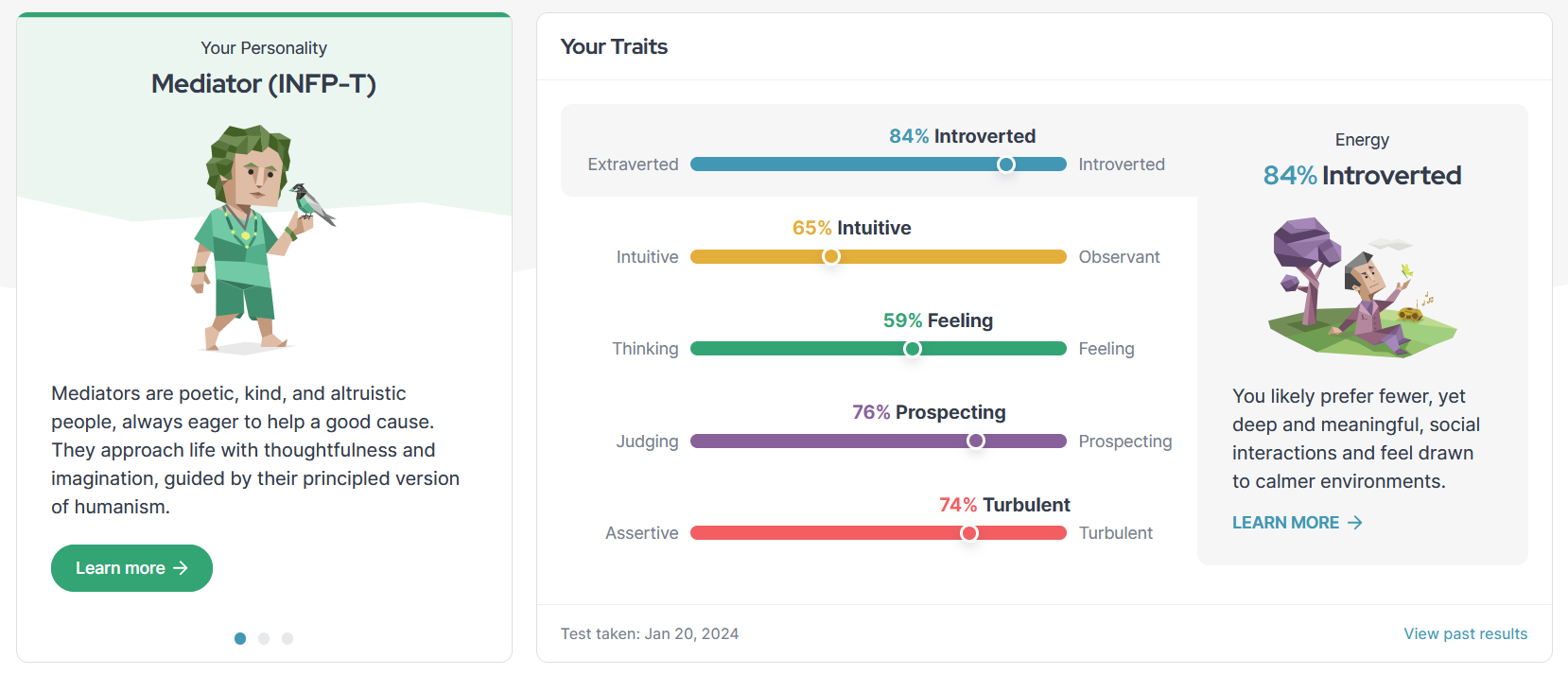
Wilson, J. (2024). 16Personalities result [Screenshot]. CC BY-NC-ND.
Ah, Myers-Briggs. While I’m assuming the leadership strengths assignment was made assuming this is the first time someone has encountered one of the infinite MBTI tests out there, I have waded through a number of them, and 16Personalities’ in particular multiple times. If there is anything that provided a framework of a persona for a lonely kid to construct among the turbulent confusion of adolescence, it’s a personality test—especially if you being an INFP-T is confirmed over multiple attempts; even today, over eight years later.
Is this a subtle endorsement for the accuracy of 16Personalities’ methodology when it comes to how latent leadership strengths might manifest in the workplace for the benefit of stakeholders? Not really. Perhaps if we lived in a perfect world, where these supposed facets of my heart of hearts remained unmarred by the innumerable rumples of life, these traits could ring true. With my teenage years far behind me and the vantage of hindsight, I find that the broad strokes of these assessments aren’t necessarily inaccurate—yet still very prescriptive, idealistically twee, and very much removed from the realities and demands of modern life, much less the day-to-day particulars of working in a library. And again, none of this takes into account the fact that I don’t have any capital L Leadership or even Management experience. Since they aren’t completely irrelevant though, we can go ahead and use these strokes to inspect how they’ve played out in my year and some change as a clerk thus far, and perhaps extrapolate into the future.
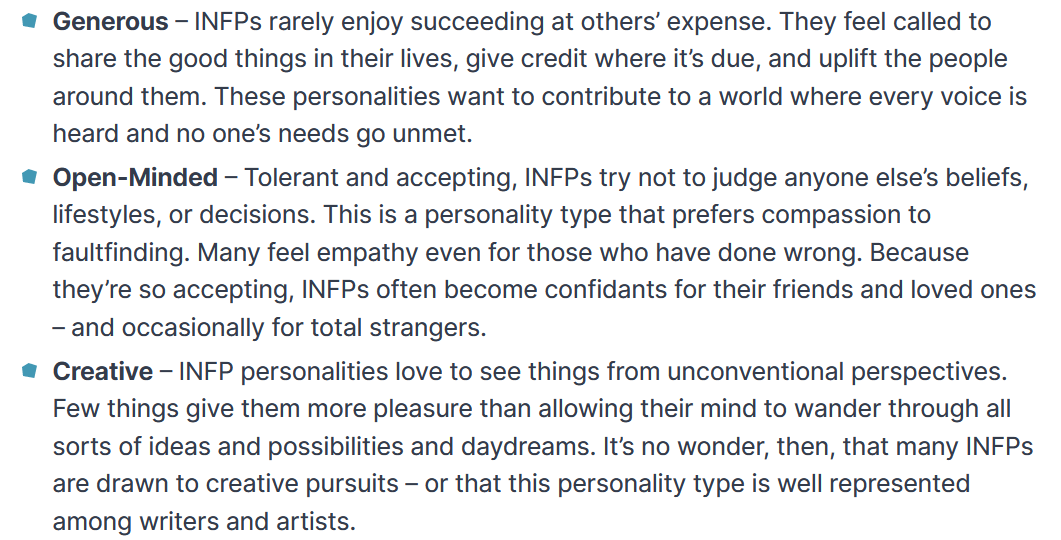
Wilson, J. (2024). INFP strengths [Screenshot]. CC BY-NC-ND
Despite all my disdain, I can, actually, nod along to most of these snippets from the strengths section. For patron issues that aren’t major, I’m mostly willing to forgive and forget minor incidents like raised noises or rough language or damaged items if they aren’t recurring, and that’s if I’m obliged to notice whatever they did “wrong” in the first place. I also move books along a fair bit faster than most of my coworkers, which in some long-laddered competitive corporate organization probably gives me license to point that out to them or a supervisor—but as long as they get their work done and aren’t deliberately, constantly leaving piles of books around, there’s little reason to get hung up on it, because it’s not like I could check in everything we get on a busy day on my own, anyway. I would very much not like to diminish or equal the efforts between me and anyone else, particularly if we’re comparing the efforts of someone in their “prime years” like me to someone closing in on their 70s.
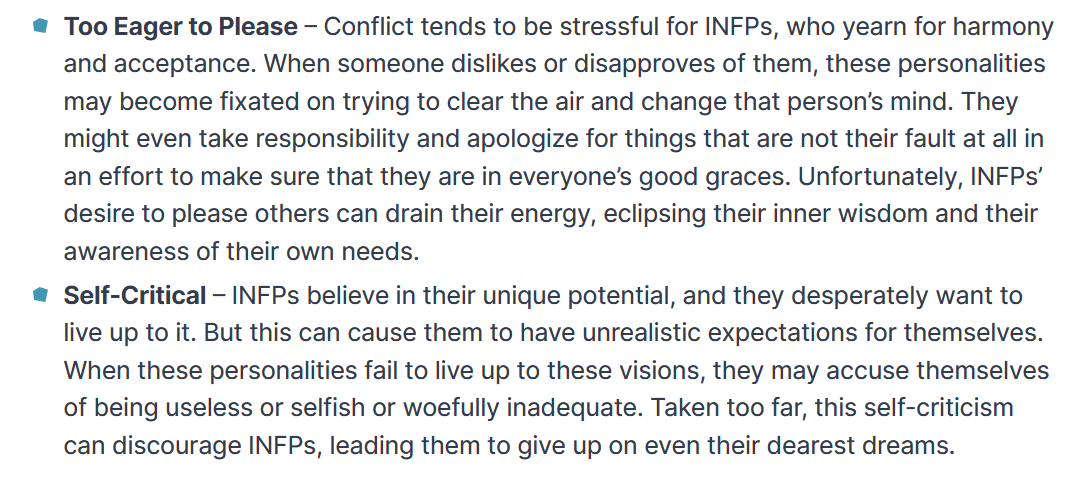
Wilson, J. (2024). INFP weakness [Screenshot]. CC BY-NC-ND
For the weaknesses section, the only wrinkle I find relevant currently is being too eager to please…which, as far as I can tell, isn’t anything other than a strength when working on the ground with patrons. It does stir up some tensions with certain coworkers in a separate department though, for reasons I can’t explain. Even though I am plagued with the fixation this section describes at times, since I can’t explain it, there isn’t a big need to fix it, especially given that it doesn’t get in the way of things when we have to work together directly.
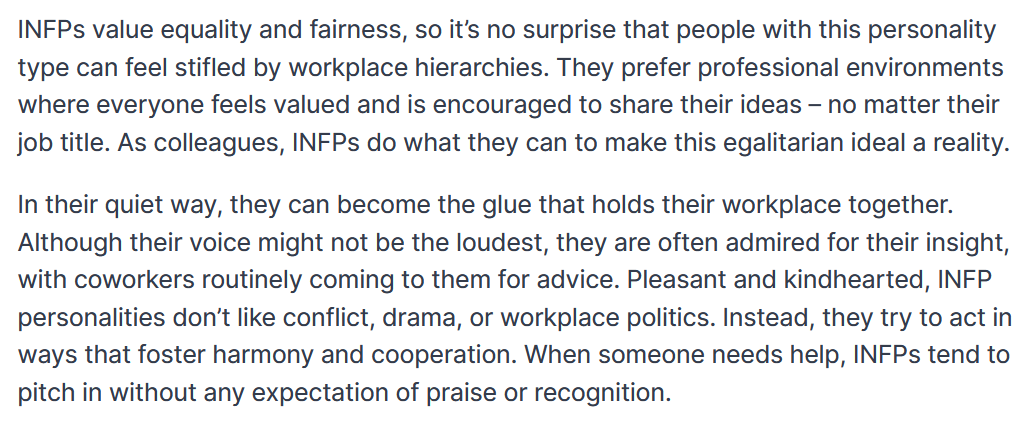
Wilson, J. (2024). INFP workplace tendencies [Screenshot]. CC BY-NC-ND
Apropos the comment about competitive organizations above, this is a spot-on observation—I think workplace hierarchies are wack! Of course, it’s not there are much if any libraries that are based around workplace hierarchies; though apparently things are trending in that direction. Moran & Morner (2018) write, “as library hierarchies become flatter and more decentralized, more and more leaders will be necessary” (p. 354). I definitely wouldn’t call myself valuable enough to be “glue” for my department, but apparently I am insightful enough that a lot of my coworkers end up nudging me in that direction with “you’ll be a good manger” comments and the like.
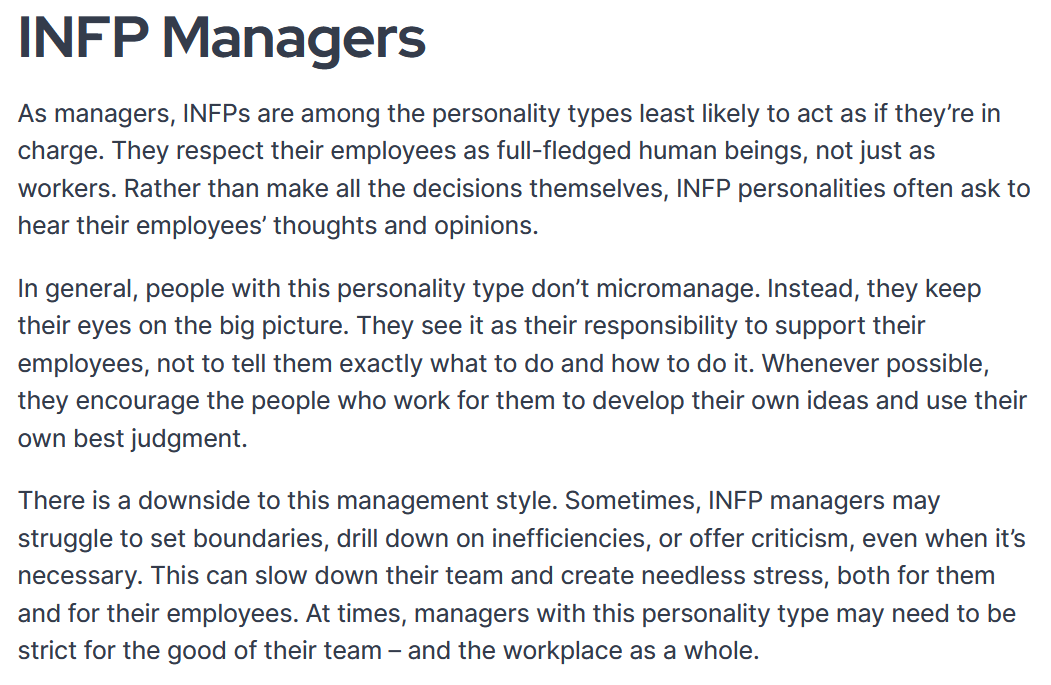
Wilson, J. (2024). INFP manager traits [Screenshot]. CC BY-NC-ND
So, though Moran and Morner conclude that “there is no single ‘right’ way to lead” (p. 351) the ending paragraph of how management is specifically described makes the preceding qualities seem rather lackluster. Despite that, I think these are the makings of good praxis! Leeder (2013) describes how “leadership” as a concept has taken on problematic overtones due to how often one or a few figureheads are the driving forces of organizations many times their size and can thus take credit for their organization’s accomplishments. Instead, Leeder suggest the following framing when it comes to the relationship between staff and their managers:
…managers don’t have staff. If anything, the staff has the manager! Such shifts in rhetoric, while seemingly simple or even nitpicky, can have a profound impact on the psyche of an organization. Each employee, regardless of their relative position in a traditional hierarchy, is considered one element in a collaborative team.Might this lead to some of the issues described above? Sure, maybe, we’ll see, I guess. But I’d much rather foster a group of colleagues who see me as someone they stand on relatively equal if not slightly higher footing than I might, efficiencies and weaknesses and what have you be darned.
References
Leeder, K. (2013, January 23). “Someday when I am incompetent…”: Reflections on the Peter Principle, leadership, and emotional intelligence. In the Library with the Lead Pipe. https://www.inthelibrarywiththeleadpipe.org/2013/someday-when-i-am-incompetent/
Moran, B. B. & Morner, C. J. (2018). Library and information center management (9th ed.). Libraries Unlimited.
Wilson, J. (2024). 16Personalities result [Screenshot]. CC BY-NC-ND.
Wilson, J. (2024). INFP manager traits [Screenshot]. CC BY-NC-ND
Wilson, J. (2024). INFP strengths [Screenshot]. CC BY-NC-ND
Wilson, J. (2024). INFP weakness [Screenshot]. CC BY-NC-ND
Wilson, J. (2024). INFP workplace tendencies [Screenshot]. CC BY-NC-ND